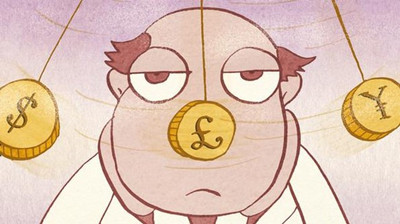The foreign-exchange market
外匯市場
Fixed rates
固定匯率
The money-spinners await their fate
貨幣投機者只能等待賺錢的時機
A CITY worker looking for a quiet place to nap nowadays could do worse than head for his bank's foreign-exchange (FX) trading floor. Once noisy with activity as gesticulating dealers moved around billions of dollars, euros and yen, it is more likely now to be an oasis of calm. Bankers are plain bored. “The FX market has been exceptionally quiet,” moaned currency analysts at Citigroup recently. “In fact, it's been so quiet that there was almost no point in writing this report.”
如果一個市政工人想找個安靜的地方打個盹兒,那他還不如去銀行的外匯交易大廳。這里曾經很嘈雜,交易員們在這里做大筆的美元、歐元和日元的外匯交易;但是現在這里卻像一片寂靜的綠洲。銀行家們簡直是閑得無聊。“外匯市場安靜得離譜!”花旗集團的一個貨幣分析師最近哀嘆道:“實際上,外匯市場如此蕭條,做這份報告幾乎沒有意義!”
The summertime torpor disguises existential angst. Regulators across the world are probing the role of banks in currency trading, apparently convinced it is the latest financial market to have been fiddled. Around 30 bank staff, including many trading-floor bosses, have been suspended or fired. Hefty fines seem inevitable. Worse, reforms may tear the heart out of the FX market as it is presently constituted. Banks, which make money by offering to buy or sell currencies from or to their clients, could go from being central actors to bit players. The future of a business which used to reap annual revenues of 20 billion is at stake.
夏季遲鈍癥掩蓋了潛在的危機。全球的監管機構都在調查銀行在貨幣交易中扮演的角色,顯然他們認為這是又一個存在商業違規行為的金融市場。將近30名銀行職員已經被停職或解雇了,其中包括許多交易大廳的老板。巨額罰款看來是不可避免的!更糟糕的是,改革可能會將外匯市場現在的核心業務分離出去。銀行之前是通過向客戶買賣外匯盈利的,但是改革之后它在外匯交易中可能將會由主角變為小角色。這個年收益200億美元的差事兒已經岌岌可危。

Not that such bounty is attainable these days anyway, given the placid state of the market. Currency-trading volumes have slumped. That is largely because the world's big central banks have replaced yo-yo-ing interest rates—which in turn determine the levels of their currency—with a uniform near-zero level since the financial crisis. The upshot is that floating exchange rates have seldom been so stable: volatility has plunged to its lowest level in two decades.
在如今這樣冷淡的市場環境下,要想獲得如此可觀的收益是很困難的。貨幣交易量已經大幅下滑,這主要是因為金融危機之后,全世界的各大央行開始推出統一的接近于零的低利率政策,而放棄了之前隨市場波動的浮動利率政策—利率反過來又影響著匯率水平。結果是浮動的匯率出現了罕見的穩定狀態:其波動率已經將至了20年來的最低水平。
As a result, once-keen users of banks' FX services have learned to do without them. Multinationals that might once have tried to hedge their foreign-currency exposures now opt to live with the risk, assuming that exchange-rate movements will remain within a limited range. Financial firms, which make up over 90% of trading volumes, have also pared back. Hedge funds that wager on currencies have shrunk or left the market in recent years. And banks, whose traders sometimes also bet on market moves, are no longer keen to do so. Appetite for risk is non-existent: “This is not a time to try something clever in FX,” says a trading boss in London.
這樣一來,那些曾經喜歡在銀行交易外匯的用戶已經不再熱衷于此了。假設匯率只在一個小范圍內浮動,那些曾經忙于對沖外匯風險的跨國公司如今也不必為此頭痛了。金融機構占據了90%的外匯交易,而現在交易量也下滑了。借助外匯進行投機的對沖基金近些年來也紛紛縮小規模或撤離市場了。對于銀行,一些交易商以前經常進行市場投機,現在這些投機活動也很少了。市場已經不再偏好風險了;一個倫敦的交易大亨說:“現在不是在外匯市場上投機的好時機!”
Volatility will eventually come back—British holidaygoers may have noticed the value of the pound rising and falling this week—as the world's biggest economies recover and interest rates move around more. But the tidy profits once made by banks may not. Much of the market for major currency pairs, such as dollar-euro or pound-yen, is now conducted electronically. Anyone wanting to exchange less than 100m is unlikely even to speak to a human being these days. The spreads on trades have become vanishingly thin. Even the profits to be made on making markets in more obscure emerging-market currencies, where spreads were once wider, have evaporated. High-frequency traders are moving in, too, hobbling banks.
匯率波動最終還是會恢復的--英國的度假者也許會注意到英鎊在本周有所起伏--世界上最大的經濟體會復蘇,利率也會有更大范圍的波動。但是過去銀行的豐厚利潤可能不復存在。主要貨幣組合大部分交易市場已經電子化,如美元-歐元、英鎊-日元交易市場。現在,任何一個想兌換不足一億美金外匯的交易商都不會把他的這筆交易告訴別人。交易商的利差將會逐漸縮小。即使是在無名的新興貨幣市場,外匯交易的額外利潤也會逐漸減少。高頻交易商同時也在進軍跛足的銀行業。
But the big worry is what regulators are likely to say and do. Although they have yet to detail their case against banks, their investigations are focusing on whether FX traders bilked clients by fiddling widely-used daily benchmarks. There is nothing sophisticated about the alleged fraud: clients looking to buy or sell FX from bank trading desks agreed to price currency deals at the price prevailing at 4pm London time, regardless of when the order was placed. Bankers soon found they could bend that price in their favour, and they did. Worse, they appear to have colluded in order to execute the scam. The transcripts of online chat rooms they used, dubbed “the Cartel” and “the Bandits' Club”, are likely to amuse neither bank compliance officers nor regulators.
但是,金融業最擔心的還是監管機構的制裁。雖然金融監管機構暫時還未對銀行案件做出詳細報告,但是他們正在集中調查外匯交易商是否通過篡改每日基準利率來欺騙客戶。這種涉嫌欺詐的行為很簡單:無論什么時候下訂單,客戶依靠倫敦時間下午四點時的價格向銀行買賣外匯;而銀行家們很快就發現他們可以通過改變那個價格使得自己更有利可圖,然后他們這么做了。更可怕的是,他們似乎是勾結起來共同謀劃這個陰謀。他們網上聊天的記錄被稱為“卡特爾”和“土匪俱樂部”,這可能是銀行合規人員和監管機構都不愿意看到的。
Much of the errant behaviour happened after banks promised to clean up, having been caught tampering with LIBOR, an interest rate used to peg contracts worth trillions of dollars. Their most plausible defence is that some watchdogs knew about the way the market actually worked, including the collusion. The Bank of England, which oversees the world's biggest FX centre in London, has suspended an employee.
被調查出篡改倫敦銀行同業拆借利率之后,商業銀行承諾清理門戶,但卻做出了許多違規行為。他們看似最合理的為自己辯護的理由是:許多監管部門一直都知道市場的實際運作方式,包括銀行間的相互勾結。英國央行監管著世界上最大的倫敦外匯中心,日前該銀行已經有一名職員被停職。
The fines for the currency fiddle could reach 26 billion globally, according to KBW, a bank. Cheated clients might sue for compensation, too. Many complain the market is no longer fit for purpose. The more powerful among them, including giant institutional investors and asset managers, might egg on regulators who want to change the way currencies are traded. The Financial Stability Board, a committee of global supervisors, has floated the idea of a “global utility” that would match supply and demand of currencies. Whatever that means—and few know for sure—it sounds like a way of sidelining bankers. More details are expected in time for a meeting of G20 leaders in November.
根據KBW銀行估計,全球范圍內針對篡改貨幣利率的罰金可達到260億美元。欺騙客戶還可能會遭到賠償起訴。許多人抱怨貨幣市場已經不再像以前那么容易控制了。包括大型機構投資者和資產管理者在內的金融從業者權利越大,就越有可能鼓動監管機構改變貨幣交易方式。金融穩定理事會是一個全球監督委員會,它提出了符合全球貨幣供求的“全球效用函數”的概念。不管這個概念具體是什么--也很少有人確切的知道--聽起來這就像是一個削弱商業銀行作用的措施。詳情將會在十一月份的20國集團金融峰會上提出。
Banks think a “fine-tuning” of the FX market and a stern reminder to traders not to be crooked would suffice. Some are paring back their currency activities, worried about profits being squashed between fixed costs and shrinking revenues—down to 13 billion this year, thinks Morgan Stanley, a bank. Those that remain may find it a harder environment to thrive in.
商業銀行認為一方面對外匯市場加以調整,另一方面鄭重提醒客戶防止受騙這兩種措施就足以解決問題。摩根史坦利銀行認為,許多銀行正在削減他們的貨幣交易業務,因為擔心由于成本固定而收入不斷下降會使利潤越來越少--今年已經下降到130億美元。而那些保留貨幣交易業務的銀行,必須在更加艱苦的市場環境中奮力求生。












